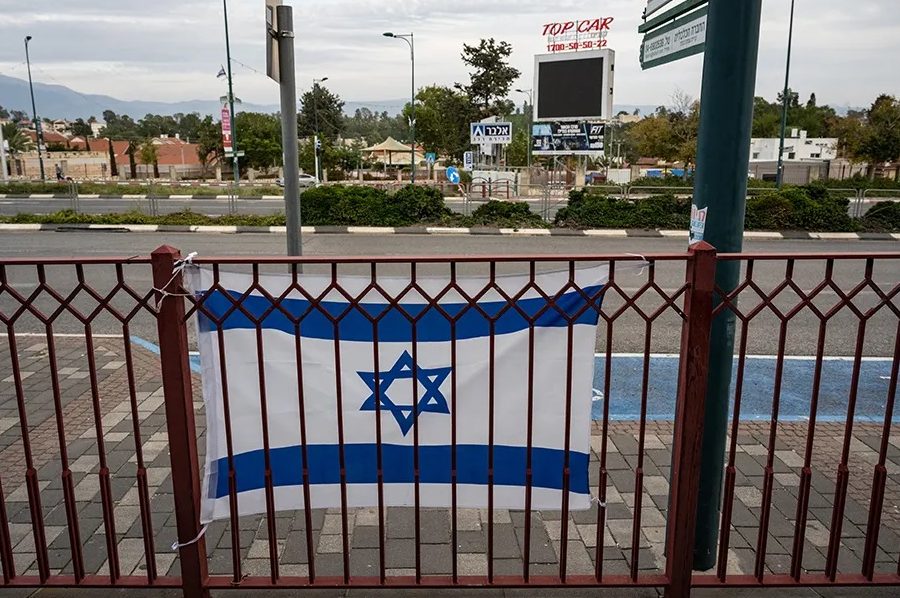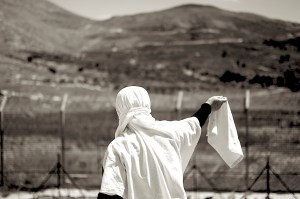The few enquiring minds still left occasionally ask me what the most underreported stories of the current Israel-Hamas conflict are. I tend to reply that there are two.
The first is the issue of Israeli refugees. They are not called that inside Israel, where the authorities prefer to refer to them as “internally displaced people.” But while the world rightly concerns itself with the internally displaced people inside Gaza, the lack of notice paid to this other story is strange.
What we have seen in Gaza is merely an opening skirmish. The real showdown will be with Tehran
For the past five months, tens of thousands of Israeli families have had to abandon their homes. After October 7, people in villages, towns and cities near the Gaza border were immediately moved out by the Israeli government — mainly to hotels around the Dead Sea and Eilat. At the same time, tens of thousands of families from the north of the country were forced to leave their homes because of the threat of bombardment and invasion by Hezbollah on the border Israel shares with Lebanon.
I have lived among these people for many months, and their misery seems to have bypassed most of the international media. Let me give an example. The 22,000 residents of Kiryat Shmona in the north were evacuated to Tel Aviv from their homes on October 7. Most have not been back. Their city’s proximity to the Lebanon border means that not only is it at risk of ground attack, it is also in exceptionally close rocket range to Hezbollah. I have been there a number of times in recent months. It is deserted, of course, although there is one quite good kebab shop open which serves the few people who go that way.
When the rockets come, you can see why it’s no longer possible to live in this city. Even the siren systems which Israel — unlike Hamas — has invested in can’t do their job effectively. A couple of rockets will land; you hear the booms. A couple of beats and then the sirens will go off.
Having been there for months, I can tell you that although these displaced people’s lives may be better than those of the citizens in Hamas-run Gaza, it isn’t much fun. It might be fun to live with your family in a hotel room for a week. It isn’t much fun to do so for months, let alone indefinitely. It is life on hold, with children missing their education.
Some people have returned to the south. The success of the operation in Gaza means that rocket fire into towns such as Sderot is now only occasional. Still, it requires a considerable amount of courage to move back. One woman in her seventies I got to know had tried several times to return home. She had heard the terrorists going past her apartment on October 7 and had two disadvantages: she lives alone and she lives on the ground floor. Ground-floor apartments in areas like Sderot that Hamas invaded are not prime real estate these days. Nevertheless, she recently summoned up the courage to return and to try to continue with her life.
The residents of the north are not so lucky. While Hamas may have been significantly degraded in Gaza (which you can also tell from the fact that what used to be daily sirens in Tel Aviv are now a monthly affair), Hezbollah’s arsenal of perhaps 160,000 rockets remains sitting on the Lebanon border. They are of a higher quality than Hamas’s rockets, longer range and far more deadly. If Hamas was Iran’s Ford Cortina, Hezbollah is its Lamborghini. And there is the question of when Iran wants to use them. It might use them any day, or it might be waiting until the regime in Tehran is on the brink of its long-sought-after nuclear bomb and can then use Hezbollah as a deterrent against any Israeli or American strike.
Which brings me to my second unreported fact. And I hope you’ve had your breakfast before digesting this.
I was on the Lebanon border eighteen years ago, during the 2006 war with Israel. I well remember the shelling and the firing. Seeing the activity there in recent months (where it is much more heated than either side wants to admit) has persuaded me of something. The war in the Middle East has not yet begun. Or at least what we have seen in Gaza is merely an opening skirmish.
No country could cope with significant swaths of its population being permanently displaced from their homes. But what the world outside the region seems not to realize is that Gaza is a sideshow. The real showdown in the region will be with Tehran.
The 2006 conflict came to a halt because the UN Security Council passed a resolution — 1701 — which assured peace with the promise that Hezbollah would not be permitted to rebuild its arsenal on Israel’s border. Since people are very keen on UN resolutions, it mystifies me that they never bothered to enforce this one. Perhaps it is the case that the UN needn’t abide by all its resolutions.
If you stand in a deserted town like Metula, right on the Lebanon border, you can see Hezbollah outposts everywhere, including observation posts. The other week I went into a hotel there that had been bombed the day before, and was told to get out because Hezbollah could see that my cameraman and I had gone in and they were likely to shell it again. Camera footage from the day before showed a UN “peacekeeping” vehicle leave its base along the border. Hezbollah fired off a barrage of rockets into Israel — as they do with some regularity — and the UN vehicle simply did a U-turn and returned to base. That isn’t peacekeeping — it’s war-watching.
So since the international community doesn’t abide by its own resolutions and has allowed Hezbollah to re-arm, it seems that it will be left to Israel to do what is needed to allow its citizens to return home. And that’s not possible solely from the air.
I hate to be the harbinger of bad news, or war. But the Middle East war has not begun. Everything so far has been a prelude.
This article was originally published in The Spectator’s UK magazine. Subscribe to the World edition here.


























Leave a Reply